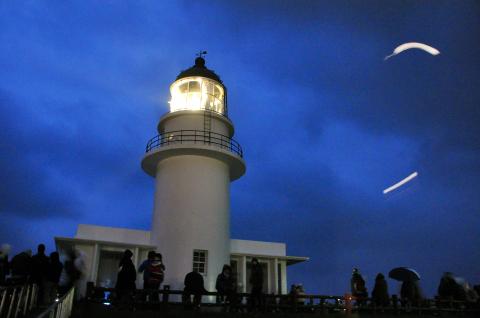The Maritime and Port Bureau under the Ministry of Transportation and Communications yesterday officially replaced the Customs Administration to become the agency in charge of all of the nation’s lighthouses and navigation aids.
To mark the transition of management, the two agencies yesterday jointly unveiled a new lighthouse plaque at the solar energy-powered Keelung lighthouse.
Located in Keelung Port, the 11m-tall brick lighthouse was built in 1900 and the lighting system has a nominal optical distance of 16 nautical miles (29.6km). The nation has a total of 34 lighthouses, 44 light posts and 14 radar beacons, including those in Taiwan proper as well as in the outlying islands of Penghu, Kinmen and Matsu.

Photo: CNA
Maritime and Port Bureau Director-General Li Juel-der (黎瑞德) said the Customs Administration had since 1868 established an excellent system and traditions to manage the nation’s lighthouses.
The bureau will strive to maintain those legacies and seek to improve upon on them, he said.
Li also welcomed the employees from the Department of Marine Affairs, who previously managed the nation’s lighthouses at Customs Administration, to join the bureau.
Li said that the nation’s lighthouses were mostly buildings with long histories and were located in islands with diverse eco-environments.
Yuwongdao (漁翁島) Lighthouse in Penghu County, for example, has been in use since 1778. The granite lighthouse on Dongjudao (東莒島) in Lienchiang County (Matsu), on the other hand, was built in 1872 after the Qing Dynasty lost the opium war against the UK and was forced to open up ports along China’s east coast for trade.
Both lighthouses have been designated as national historical sites by the government, he said.
Li also mentioned the lighthouses in Sandiaojiao (三貂角) and Pengjia Islet (彭佳嶼), both of which were famous for their unique architecture.
According to the bureau, six lighthouses are open to the public — at Yuwengdao, Dongjudao, Cape San Diego, Oluanpi (鵝鑾鼻), Dongyin Island (東引島) and Greater Kaohsiung.
Customs Administration Deputy Director Tseng Ching-yen (曾清煙) said his agency started building lighthouses and other navigation aids in seaports when the Qing dynasty employed British consular official Robert Hart as China’s second inspector-general at the Imperial Maritime Custom Service.
From 1863 to 1911, Hart facilitated the construction of lighthouses and established systems for tax and postal services, he said.
Though the Japanese government managed to build more lighthouses in the colonial era from 1895 to 1945, most of them were severely damaged during World War II, he said.
He said that the Customs Administration took over the management of the lighthouses in 1946 and immediately began restoration work on all the buildings.
Tseng said the nation in 2007 started following the regulations on navigation aids set by the International Association of Marine Aids to Navigation and Lighthouse Authorities, which ensured that the nation’s navigation safety standards are in synch with those of the international community.

Taiwan has received more than US$70 million in royalties as of the end of last year from developing the F-16V jet as countries worldwide purchase or upgrade to this popular model, government and military officials said on Saturday. Taiwan funded the development of the F-16V jet and ended up the sole investor as other countries withdrew from the program. Now the F-16V is increasingly popular and countries must pay Taiwan a percentage in royalties when they purchase new F-16V aircraft or upgrade older F-16 models. The next five years are expected to be the peak for these royalties, with Taiwan potentially earning

STAY IN YOUR LANE: As the US and Israel attack Iran, the ministry has warned China not to overstep by including Taiwanese citizens in its evacuation orders The Ministry of Foreign Affairs (MOFA) yesterday rebuked a statement by China’s embassy in Israel that it would evacuate Taiwanese holders of Chinese travel documents from Israel amid the latter’s escalating conflict with Iran. Tensions have risen across the Middle East in the wake of US and Israeli airstrikes on Iran beginning Saturday. China subsequently issued an evacuation notice for its citizens. In a news release, the Chinese embassy in Israel said holders of “Taiwan compatriot permits (台胞證)” issued to Taiwanese nationals by Chinese authorities for travel to China — could register for evacuation to Egypt. In Taipei, the ministry yesterday said Taiwan

Taiwan is awaiting official notification from the US regarding the status of the Agreement on Reciprocal Trade (ART) after the US Supreme Court ruled US President Donald Trump's global tariffs unconstitutional. Speaking to reporters before a legislative hearing today, Premier Cho Jung-tai (卓榮泰) said that Taiwan's negotiation team remains focused on ensuring that the bilateral trade deal remains intact despite the legal challenge to Trump's tariff policy. "The US has pledged to notify its trade partners once the subsequent administrative and legal processes are finalized, and that certainly includes Taiwan," Cho said when asked about opposition parties’ doubts that the ART was

If China chose to invade Taiwan tomorrow, it would only have to sever three undersea fiber-optic cable clusters to cause a data blackout, Jason Hsu (許毓仁), a senior fellow at the Hudson Institute and former Chinese Nationalist Party (KMT) legislator, told a US security panel yesterday. In a Taiwan contingency, cable disruption would be one of the earliest preinvasion actions and the signal that escalation had begun, he said, adding that Taiwan’s current cable repair capabilities are insufficient. The US-China Economic and Security Review Commission (USCC) yesterday held a hearing on US-China Competition Under the Sea, with Hsu speaking on